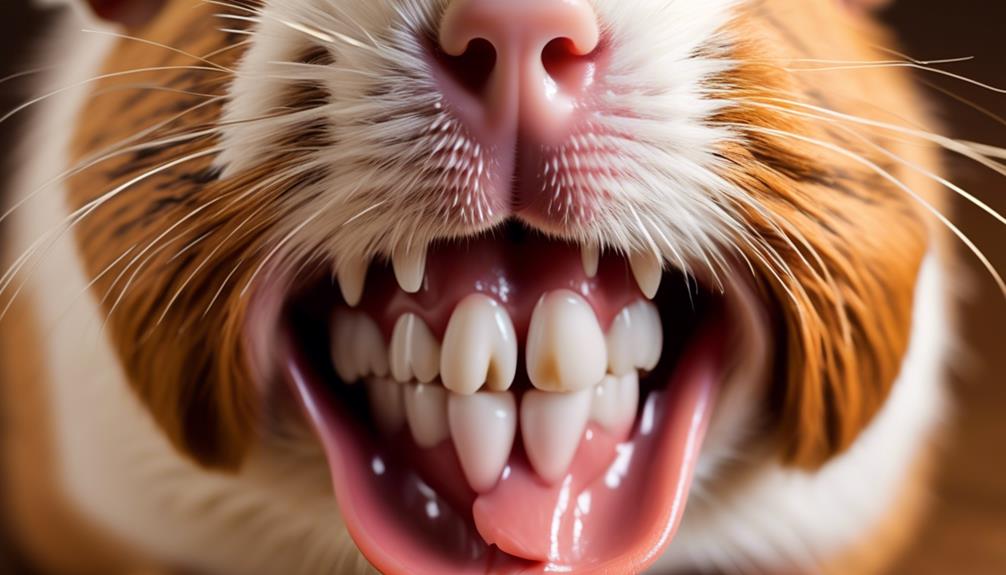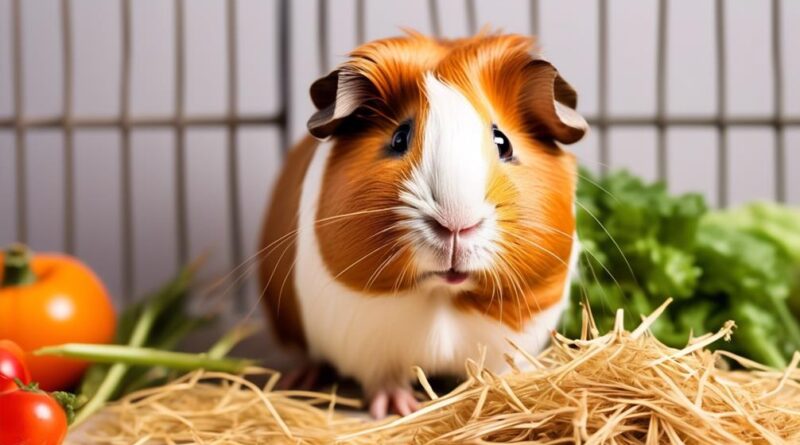Five Tips for Maintaining Your Guinea Pig's Dental Health
Have you ever wondered how to ensure your guinea pig's dental health is in top shape?
It's common knowledge that guinea pigs have continuously growing teeth, but did you know that dental issues can lead to serious health problems for them?
By implementing a few simple tips, you can take proactive steps to maintain your guinea pig's dental health and prevent potential complications down the road.
Understanding Guinea Pig Dental Anatomy

Understanding your guinea pig's dental anatomy is crucial for ensuring their overall health and well-being. Guinea pigs have open-rooted teeth, which means they continuously grow throughout their lives. Their front teeth, known as incisors, are used for cutting and nibbling, while their back teeth, called molars, are used for grinding food. This unique dental anatomy reflects the importance of dental care in maintaining your guinea pig's dental health.
Guinea pig teeth are essential for their overall well-being, as dental problems can lead to severe health issues. Without proper dental care, guinea pigs can suffer from overgrown teeth, malocclusion, abscesses, and even weight loss due to difficulty eating. Understanding guinea pig anatomy is the first step in preventing these dental problems. Regularly inspect your guinea pig's teeth for signs of overgrowth or misalignment, and provide them with proper chew toys to help wear down their teeth naturally.
To ensure your guinea pig's dental health, it's vital to provide a balanced diet that includes plenty of hay and fibrous vegetables. These foods not only help wear down their teeth but also promote good dental health. Additionally, scheduling regular check-ups with a veterinarian who specializes in exotic pets can help detect and address any potential dental issues early on.
Signs of Dental Problems in Guinea Pigs
You can identify dental problems in your guinea pig by observing their eating habits and looking for signs of drooling, weight loss, or reluctance to eat hard foods. Dental disease in guinea pigs can lead to serious health issues if not addressed promptly. Here are some signs to watch out for:
- Changes in Eating Habits
- Loss of appetite or difficulty chewing
- Preference for softer foods and avoidance of hard pellets or hay
- Behavioral Signs
- Increased drooling or wetness around the mouth
- Reluctance to groom themselves due to oral discomfort
Dental care is crucial for maintaining your guinea pig's overall health. Regular veterinary check-ups can help detect dental problems early on. Additionally, providing a diet rich in hay and fibrous vegetables can promote good dental health by encouraging natural wearing down of the teeth. Moreover, offering safe chew toys can also help keep their teeth at an appropriate length and prevent dental issues.
Importance of Proper Diet for Dental Health
To maintain your guinea pig's dental health, a proper diet rich in hay and fibrous vegetables is essential for promoting natural wearing down of their teeth and preventing potential dental issues. Proper nutrition plays a crucial role in ensuring your guinea pig's dental care. Guinea pigs have continuously growing teeth, and a lack of proper diet can lead to overgrowth, malocclusion, and other dental problems.
Guinea pigs require a diet high in hay to aid in wearing down their teeth. The constant chewing and gnawing on hay help to naturally grind down their teeth, preventing them from becoming overgrown. Additionally, fibrous vegetables such as kale, parsley, and celery are also essential as they provide the necessary roughage to keep the teeth at an optimal length. Ensuring that your guinea pig's diet is well-balanced with these components is vital for their dental health.
A diet lacking in hay and fibrous vegetables can lead to serious dental issues, causing pain and discomfort for your guinea pig. Dental problems can also result in difficulty eating, weight loss, drooling, and even behavioral changes. By providing a proper diet, you can help your guinea pig avoid these problems and maintain good dental health.
Providing Chew Toys for Dental Maintenance
Proper nutrition is vital for maintaining your guinea pig's dental health. An additional way to support their dental maintenance is by providing chew toys that promote natural wearing down of their teeth. Choosing appropriate chew toys is crucial to ensure your guinea pig's dental health benefits from them. Opt for toys made of safe, non-toxic materials such as untreated wood, woven grass, or hard rubber. It's important to avoid toys with small, detachable parts that could be ingested and cause harm.
Training your guinea pig to use chew toys can be a fun and rewarding experience for both you and your pet. Encourage them to interact with the toys by placing them in different areas of their habitat and incorporating them into playtime. Additionally, rotating different types of chew toys can keep your guinea pig engaged and prevent boredom.
Incorporating chew toys into your guinea pig's dental care routine can be complemented with dental care products such as chewable treats specifically designed to promote dental health. When introducing new toys or treats, monitor your guinea pig's behavior and health to ensure they're well-tolerated.
Establishing a dental health routine that includes providing chew toys can contribute to overall well-being and prevent dental issues in your guinea pig. By offering appropriate chew toys and incorporating them into your pet's routine, you can help maintain their dental health and ensure their teeth stay in good condition.
Regular Veterinary Dental Check-ups
Regular veterinary dental check-ups are essential for monitoring and maintaining your guinea pig's oral health. Just like humans, guinea pigs require regular dental care to prevent dental issues and ensure overall well-being. Veterinary recommendations suggest that guinea pigs should undergo dental check-ups at least once a year.
During these check-ups, a veterinarian will examine your guinea pig's teeth and oral cavity for any signs of overgrowth, misalignment, or other dental problems. Catching these issues early can prevent discomfort and more serious health problems for your furry friend.
In addition to examining your guinea pig's teeth, the veterinarian can also provide guidance on dental health maintenance. They can recommend suitable chew toys, proper diet, and other measures to support your guinea pig's dental well-being.
Some guinea pigs may require more frequent dental check-ups, especially if they have a history of dental problems or are older. By following your veterinarian's advice and scheduling regular dental check-ups, you can help ensure that your guinea pig maintains healthy teeth and gums throughout its life.
Trimming Guinea Pig's Teeth
When your guinea pig's dental check-ups reveal overgrowth or misalignment, addressing these issues may involve trimming your guinea pig's teeth. It's essential to understand the importance of proper dental hygiene for your guinea pig to prevent potential dental problems.
Here are some important points to consider when it comes to trimming your guinea pig's teeth:
- Tooth filing
Trimming your guinea pig's teeth, also known as tooth filing, should be performed by a qualified veterinarian who's experienced in handling small animals like guinea pigs. Attempting to trim your guinea pig's teeth at home can lead to accidental injury and should be avoided.
- Dental hygiene
Alongside tooth filing, maintaining good dental hygiene for your guinea pig is crucial. Provide your guinea pig with plenty of hay, which helps in naturally wearing down their teeth. Additionally, incorporating chew toys specifically designed for guinea pigs can also aid in keeping their teeth at a healthy length.
Monitoring Your Guinea Pig's Eating Habits
You can ensure your guinea pig's health by paying close attention to its eating habits. Food portioning is crucial to prevent overeating and obesity in guinea pigs. The recommended daily amount of guinea pig food is 1/8 cup of high-quality pellets per guinea pig, along with a variety of fresh vegetables. Monitor your guinea pig's food intake to ensure it's consuming an appropriate amount. If you notice that your guinea pig consistently leaves food behind, you may be providing too much food. On the other hand, if the food disappears quickly and your guinea pig seems constantly hungry, you may need to adjust the portion size or provide more hay to promote a healthy eating pattern.
Chewing behavior is another important aspect to observe. Guinea pigs have open-rooted teeth, which means their teeth continuously grow throughout their lives. Proper chewing behavior is essential for wearing down their teeth and preventing overgrowth. Keep an eye on your guinea pig's chewing habits to ensure they're grinding their teeth properly. If you notice a change in chewing behavior or if your guinea pig stops eating altogether, it could be a sign of dental issues that require immediate attention from a veterinarian.
Preventing Dental Issues With Proper Care
To maintain your guinea pig's dental health, provide a balanced diet consisting of high-quality pellets, fresh vegetables, and hay, ensuring proper chewing behavior to prevent dental issues. Additionally, proper grooming is essential for preventing dental problems in guinea pigs. Here are some tips for preventing dental issues with proper care:
- Proper grooming
- Regularly check your guinea pig's fur around the mouth area for any debris or matting that could hinder chewing. Trim long fur around the mouth carefully to ensure it doesn't obstruct your guinea pig's ability to eat and chew properly.
- Brush your guinea pig's fur frequently to prevent the ingestion of loose hairs, which can form hairballs and affect dental health.
- Dental care techniques
- Provide appropriate chew toys for your guinea pig to help maintain dental health. Wooden chew toys and safe gnawing materials can aid in wearing down their continuously growing teeth.
- Schedule regular check-ups with an exotic animal veterinarian who can assess your guinea pig's dental health and provide professional dental care if needed.
Frequently Asked Questions
Can Guinea Pigs Have Dental Problems Even if They Are Eating Normally?
Even if your guinea pig eats normally, dental problems can still occur. Causes of dental problems include overgrown teeth and malocclusion. To prevent issues, provide chew toys, a balanced diet, and regular dental check-ups.
What Are Some Common Misconceptions About Guinea Pig Dental Health?
Common misconceptions about guinea pig dental health include the belief that they don't need dental care. Improper diet and misdiagnosis also contribute to dental problems. It's important to prioritize their dental health for overall well-being.
Are There Any Specific Breeds of Guinea Pigs That Are More Prone to Dental Issues?
Specific breeds of guinea pigs, like the Abyssinian and Silkie, may be more prone to dental issues. Regular dental care, preventative measures, and dental check-ups can help prevent dental issues in guinea pigs.
How Can I Tell if My Guinea Pig Is in Pain Due to Dental Problems?
If your guinea pig is in pain due to dental problems, signs may include drooling, weight loss, and difficulty eating. Treatment involves a vet's assessment and possible tooth trimming. Prevention includes providing proper diet and chew toys.
Can Dental Issues in Guinea Pigs Lead to Other Health Problems?
Yes, dental issues in guinea pigs can lead to other health problems. Prevention methods such as regular dental check-ups and a proper dental care routine are essential to ensure their overall well-being and health.
Conclusion
In conclusion, taking care of your guinea pig's dental health is crucial for their overall well-being. By understanding their dental anatomy, watching for signs of dental problems, providing a proper diet and chew toys, and scheduling regular veterinary check-ups, you can help prevent dental issues and ensure your guinea pig maintains a healthy smile.
With proper care and attention, you can keep your guinea pig's teeth in tip-top shape for a happy and healthy pet.
